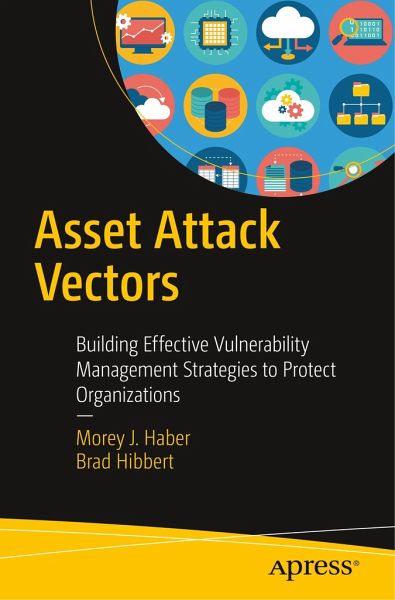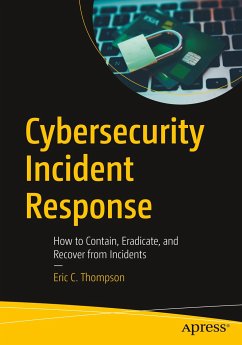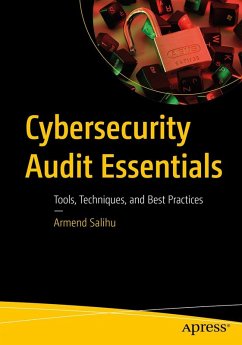
Asset Attack Vectors
Building Effective Vulnerability Management Strategies to Protect Organizations

PAYBACK Punkte
17 °P sammeln!
Build an effective vulnerability management strategy to protect your organization's assets, applications, and data.Today's network environments are dynamic, requiring multiple defenses to mitigate vulnerabilities and stop data breaches. In the modern enterprise, everything connected to the network is a target. Attack surfaces are rapidly expanding to include not only traditional servers and desktops, but also routers, printers, cameras, and other IOT devices. It doesn't matter whether an organization uses LAN, WAN, wireless, or even a modern PAN-savvy criminals have more potential entry points...
Build an effective vulnerability management strategy to protect your organization's assets, applications, and data.
Today's network environments are dynamic, requiring multiple defenses to mitigate vulnerabilities and stop data breaches. In the modern enterprise, everything connected to the network is a target. Attack surfaces are rapidly expanding to include not only traditional servers and desktops, but also routers, printers, cameras, and other IOT devices. It doesn't matter whether an organization uses LAN, WAN, wireless, or even a modern PAN-savvy criminals have more potential entry points than ever before. To stay ahead of these threats, IT and security leaders must be aware of exposures and understand their potential impact.
Asset Attack Vectors will help you build a vulnerability management program designed to work in the modern threat environment. Drawing on years of combined experience, the authors detail the latest techniques for threat analysis, risk measurement, and regulatory reporting. They also outline practical service level agreements (SLAs) for vulnerability management and patch management.
Vulnerability management needs to be more than a compliance check box; it should be the foundation of your organization's cybersecurity strategy. Read Asset Attack Vectors to get ahead of threats and protect your organization with an effective asset protection strategy.
What You'll Learn
Create comprehensive assessment and risk identification policies and procedures Implement a complete vulnerability management workflow in nine easy steps Understand the implications of active, dormant, and carrier vulnerability states Develop, deploy, and maintain custom and commercial vulnerability management programs Discover the best strategies for vulnerability remediation, mitigation, and removal Automate credentialed scans that leverage least-privilege access principles Read real-world case studies that share successful strategies and reveal potential pitfalls
Who This Book Is For
New and intermediate security management professionals, auditors, and information technology staff looking to build an effective vulnerability management program and defend against asset based cyberattacks
Today's network environments are dynamic, requiring multiple defenses to mitigate vulnerabilities and stop data breaches. In the modern enterprise, everything connected to the network is a target. Attack surfaces are rapidly expanding to include not only traditional servers and desktops, but also routers, printers, cameras, and other IOT devices. It doesn't matter whether an organization uses LAN, WAN, wireless, or even a modern PAN-savvy criminals have more potential entry points than ever before. To stay ahead of these threats, IT and security leaders must be aware of exposures and understand their potential impact.
Asset Attack Vectors will help you build a vulnerability management program designed to work in the modern threat environment. Drawing on years of combined experience, the authors detail the latest techniques for threat analysis, risk measurement, and regulatory reporting. They also outline practical service level agreements (SLAs) for vulnerability management and patch management.
Vulnerability management needs to be more than a compliance check box; it should be the foundation of your organization's cybersecurity strategy. Read Asset Attack Vectors to get ahead of threats and protect your organization with an effective asset protection strategy.
What You'll Learn
Create comprehensive assessment and risk identification policies and procedures Implement a complete vulnerability management workflow in nine easy steps Understand the implications of active, dormant, and carrier vulnerability states Develop, deploy, and maintain custom and commercial vulnerability management programs Discover the best strategies for vulnerability remediation, mitigation, and removal Automate credentialed scans that leverage least-privilege access principles Read real-world case studies that share successful strategies and reveal potential pitfalls
Who This Book Is For
New and intermediate security management professionals, auditors, and information technology staff looking to build an effective vulnerability management program and defend against asset based cyberattacks














